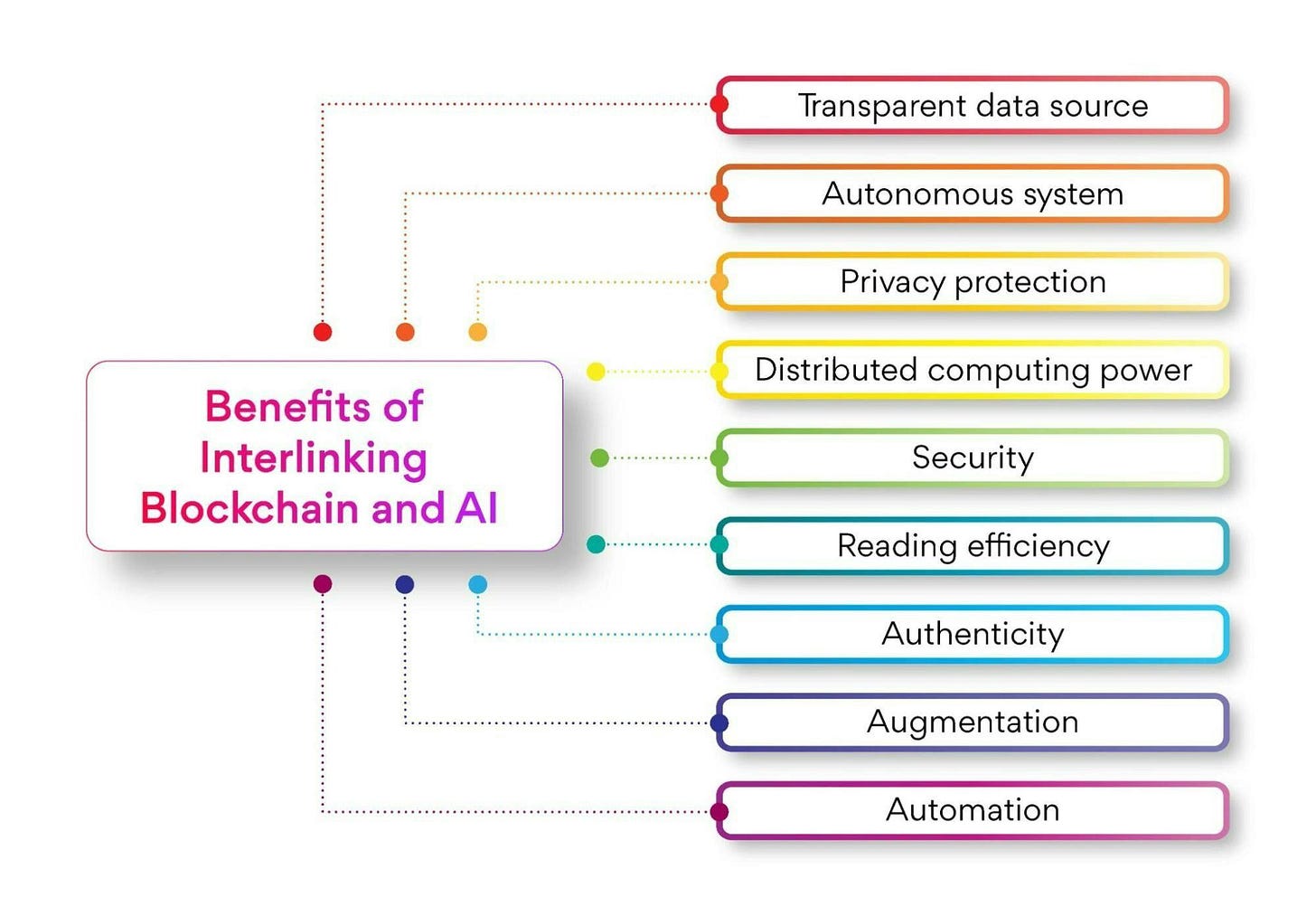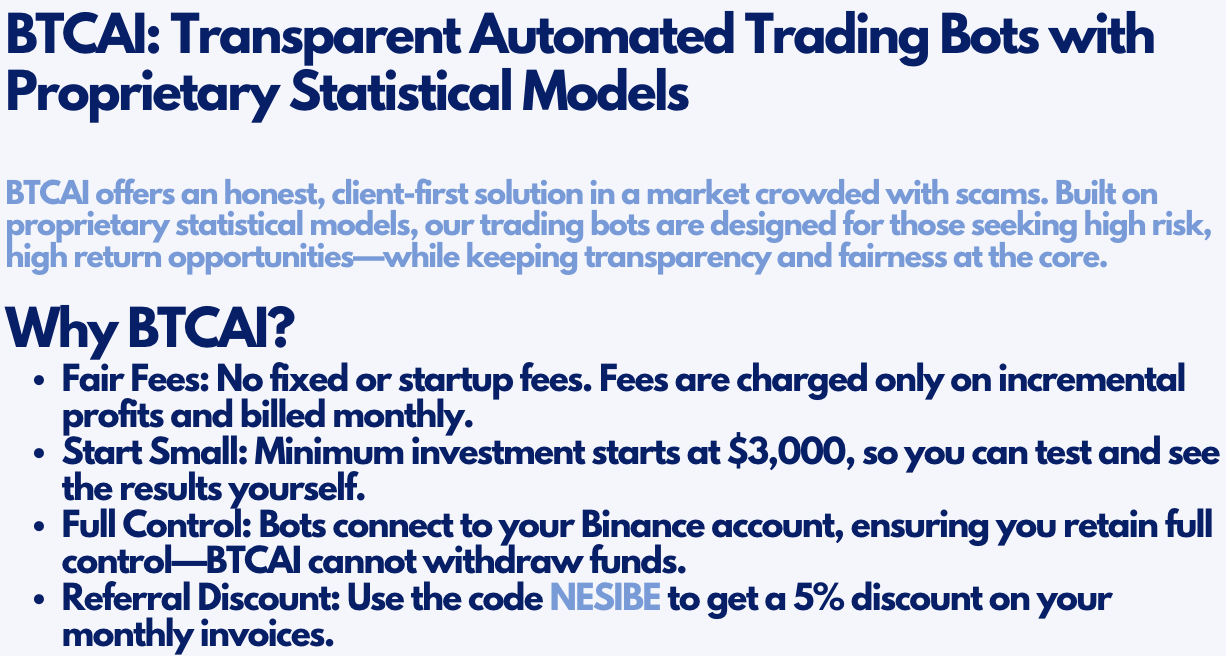AI Meets Blockchain
the Role of Artificial Intelligence in Revolutionizing Security, Efficiency, and Trust in Blockchain Ecosystems
It’s been a while since I’ve really gotten into the blockchain space here, and not because I lost interest. This last year, with all eyes on AI, blockchain seemed to step aside momentarily—not out of weakness, but as the AI policy narrative accelerated faster than anticipated. But now, as we approach what looks like the next crypto bull season, and with Trump signaling his own take on crypto’s future, I felt it was time to address the potential convergence of two of the most influential technologies of our time: AI and blockchain.
And this one is also special with our very first sponsor: BTCAI. I’m thrilled to partner with a company that doesn’t just focus on pushing its products but genuinely values content that informs, explores, and adds real insights. With BTCAI, we'll not only get to see their innovative offerings, but we’ll also have the chance to engage with their perspectives on the intersections of AI, blockchain, and decentralized finance. They’re also committed to supporting students and fostering the growth of their projects, an effort that really aligns with the spirit of decentralized innovation.
Sneak peek: Use the code NESIBE to get a 5% discount on your monthly invoices.
So, let’s get started—today, we’re exploring where AI is heading within DeFi and what this could mean for the future of decentralized finance as it converges with machine learning, automation, and blockchain advancements.
The Rise of DeFi and AI’s Role in Its Transformation
Over the past few years, DeFi has transformed from a niche experiment into a formidable ecosystem that seeks to redefine traditional finance. This evolution isn’t just about decentralized applications for trading, lending, or staking; it's about creating a foundational shift in how financial services operate globally.
AI is entering this space not as an outsider but as a powerful catalyst, bringing tools like machine learning, automation, and data-driven algorithms into the mix. This isn’t just another tech trend—DeFi’s open and permissionless nature makes it the perfect testing ground for AI’s capabilities.
Survey Insight: According to Turing Institute, blockchain will make AI more consistent, understandable, and logical. Blockchain’s ledger system allows users to trace and verify AI decisions, creating a new level of transparency.
With this synergy, we’re witnessing the rise of smart contracts that think, algorithms that adapt rather than react, and analytics that go far beyond simple predictions. The big question: Where does this lead, and what should we expect?
Blockchain and AI: A Synergy with Transformative Potential
While AI and blockchain have distinct roots, their convergence is creating a paradigm shift. They complement each other in ways that unlock new possibilities. Blockchain ensures secure and transparent data handling, while AI processes and interprets data on a large scale. Together, they make systems that are more secure, efficient, and adaptable.
Key Integration Benefits:
Transparent Data Source
AI needs vast amounts of high-quality data to perform effectively. Blockchain’s transparent and verifiable records provide a trustworthy data source, ensuring models are trained on consistent and reliable information.Autonomous Systems
Blockchain’s decentralized ledger eliminates reliance on a single server, allowing AI to function as an autonomous system. This decentralization enhances the management of AI training and operations without requiring continuous supervision.Privacy Protection
Privacy concerns are a growing challenge in AI. Blockchain’s cryptographic techniques allow AI to process data securely, protecting user privacy even as complexity and competition in AI models increase.Distributed Computing Power
AI requires significant computational resources for training and operations. Blockchain can distribute these demands, reducing costs and handling infrastructure needs like storage, hardware, and software maintenance.Enhanced Security
While blockchain smart contracts can have vulnerabilities, AI can strengthen their security. By using AI to monitor and improve contract logic, these systems become more resistant to exploitation and fraud.Improved Reading Efficiency
Blockchain’s design often prioritizes write-intensive operations over query performance. AI can enhance data retrieval efficiency, addressing bottlenecks in blockchain data storage through novel protocols like TTA-CB with PSO algorithms. This results in faster and more reliable query handling.Data Authenticity
Blockchain’s digital records provide insight into AI frameworks and the provenance of the data they use, addressing challenges around explainable AI. This boosts trust in both the integrity of data and the recommendations AI provides.Augmentation
AI can rapidly analyze and process blockchain data, delivering actionable insights. This capability scales blockchain networks, enabling the sharing and analysis of larger datasets for better decision-making.Automation
When AI models are embedded within smart contracts, processes become faster, more efficient, and frictionless. For instance, AI-driven automation can resolve disputes or optimize logistics without manual intervention.
AI for Enhanced Security: Identifying Threats Before They Happen
The integration of AI into blockchain ecosystems strengthens their defense against fraud, cyberattacks, and operational inefficiencies. By leveraging advanced technologies like natural language processing (NLP), image recognition, and anomaly detection algorithms, AI enhances blockchain’s capacity to identify threats proactively, ensuring a safer decentralized environment.
Applications in Algorithmic Trading and Cybersecurity
Predictive Threat Detection
AI-powered systems can analyze historical and real-time blockchain data to predict and prevent potential vulnerabilities.For instance, they can detect unusual wallet behaviors (such as rapid fund movement) or recognize anomalous transaction patterns that indicate money laundering attempts.
Enhanced Operational Security
Through constant monitoring, AI algorithms can recognize and respond to Distributed Denial of Service (DDoS) attacks, ensuring network uptime and stability.Example: AI-driven smart firewalls built on blockchain automatically adapt to new types of cyberattacks.
Fraud Prevention in Blockchain Networks
By continuously scanning data on decentralized networks, AI can identify and neutralize fraudulent activities before they disrupt the system.Stat Insight: OpenAI’s anomaly detection project achieved a 22% reduction in flagged fraudulent transactions during its trial, setting a benchmark for blockchain security.
Strengthening Smart Contracts
AI can scan smart contracts for vulnerabilities, such as reentrancy bugs or logic errors, before deployment. Additionally, NLP capabilities allow contracts to become self-verifying, ensuring compliance with their terms.Stat Insight: KPMG estimates that AI-driven smart contracts can reduce claims processing times by 30%, particularly in sectors like insurance and real estate.
Optimized Resource Management
AI identifies the most efficient nodes in a blockchain network for processing transactions, reducing energy consumption and overall costs. For example:
Instead of all nodes performing redundant tasks, AI pinpoints the best-performing node, saving up to $9 billion annually in peer-to-peer transaction costs.
While AI provides immediate solutions to protect blockchain systems from emerging threats, machine learning adds a layer of adaptability and foresight, enabling DeFi ecosystems to grow sustainably.
Machine Learning in DeFi: A New Standard in Security and Predictive Analytics
Beyond enhancing security, machine learning equips DeFi platforms with the tools they need to predict trends, manage risks, and drive long-term growth.
Risk Management and Predictive Insights
Fraud Detection Through ML Models
ML algorithms can identify intricate fraud patterns that elude static detection methods. These systems adapt as fraud tactics evolve, ensuring continuous security improvements.In DeFi lending, ML models analyze on-chain behavior to spot high-risk wallets, reducing default rates by 15%.
Market Dynamics and Trend Analysis
ML systems assess historical and live blockchain data to:Predict market volatility and suggest optimal strategies for users.
Anticipate user behavior trends in staking or lending activities.
Forecast token price movements using external indicators like macroeconomic factors.
Enhanced Financial Accessibility
AI and ML systems lower the barrier for small businesses to access decentralized services by creating decentralized intelligence networks.Stat Insight: Blockchain-enabled AI systems have improved institutional trust by over 50%, according to Turing Research.
Data Monetization and Scalability
ML models unlock new revenue streams by enabling data monetization through decentralized data centers. These centers allow individuals to sell their data securely without relying on tech monopolies.
Example: Facebook’s data-centric revenue model could transition to user-controlled platforms powered by blockchain and AI, creating fairer data economies.
Industry Examples
Finance: AI-driven models process loan applications faster, eliminating intermediaries.
Example: Blockchain’s transparent records and AI’s automation allow faster loan closures, enhancing borrower experiences.
Retail: AI in blockchain tracks customer behaviors, storing immutable insights that help refine marketing strategies.
Healthcare: AI combined with blockchain ensures real-time access to patient records, improving treatment accuracy and safeguarding privacy.
The Road Ahead
ML brings an unmatched layer of intelligence to blockchain-based networks, driving automation, scalability, and actionable insights. From supply chains to decentralized finance, ML models are setting the foundation for trustworthy and efficient ecosystems.
The Ethical and Transparency Challenges of AI in DeFi
While the benefits are evident, the integration of AI in DeFi isn’t without significant challenges. Chief among them are transparency and ethical considerations. As AI models grow more complex, there’s a real risk that the processes behind smart contracts and automated trading could become too opaque, even for experienced users. For a technology built on transparency and decentralization, DeFi can’t afford to lose sight of its foundational values.
There’s also the question of ethical boundaries. Without sufficient oversight, AI’s role in financial automation could lead to systemic biases, potentially affecting market fairness and stability. This isn’t just a technical issue but a policy and governance one. To maintain DeFi’s credibility, we must establish standards that ensure both transparency and ethical integrity, even as AI pushes the boundaries of what decentralized finance can achieve.
Transparency Risk: AI models, when not monitored, can introduce opacities that go against DeFi’s ethos of transparency. Companies must prioritize “explainability” in AI models to maintain user trust.
Ethical Concerns: AI’s potential for bias is a well-known issue, and as autonomous systems become more prevalent in DeFi, this bias could affect market fairness. For DeFi to retain credibility, we must establish ethical standards that govern the use of AI.
Challenges and Future Outlook: Where Do We Go from Here?
While AI and blockchain are achieving remarkable synergy, there are still challenges—particularly around data privacy and ethical considerations. As AI models become more complex, integrating data from blockchain can expose privacy concerns, particularly in industries like healthcare where sensitive information is involved. Furthermore, the ethical considerations of AI-powered automation in DeFi—such as in autonomous financial decision-making—highlight the importance of accountability and transparency.
Ethical Note: The need for responsible AI is particularly vital in DeFi, where automated systems handle significant financial transactions without direct human oversight.
In this rapidly evolving space, understanding the implications for businesses, investors, and consumers will be essential. Here’s a quick recap:
For Businesses: With hands-off regulatory approaches, businesses have room to innovate but must self-regulate to mitigate potential volatility.
For Investors: A favorable growth environment with fewer restrictions, though proof of trust remains essential for stability.
For Consumers: In a decentralized landscape, vigilance and understanding of principles like “Not your keys, not your coins” are crucial.
Now, with our sponsor…
Be Part of the Journey
BTCAI is proud to sponsor a Bilkent Business School final-year project. As part of this collaboration, the student team is conducting interviews with potential investors to gather insights and feedback. If you’re interested in contributing or learning more, please reach out at hello@btcai.eu.
For more details, visit our website at btcai.eu, or connect with Hacı Ahmet Kurtaran.
BTCAI: Smarter trading, full transparency, and real results.





